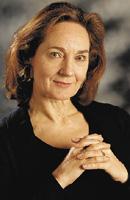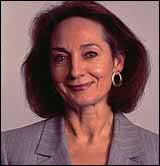Reliable, loyal, sensible and her father's child

The new chairperson of the RTÉ Authority is the apolitical daughter of a former TD. Behind a contrived air-head exterior there is a calculating, formidable executive, on whom RTÉ can rely. By Colin Murphy.
On 11 November 1953 a TD rose in Dáil Eireann to speak on the vote on “wireless broadcasting”. He was concerned about drama policy in Radio Éireann which he believed depicted Irish people in stage-Irish stereotypes. He was dismissive of criticisms of “Oxford accents” on Irish radio. He said: “It is a good thing to have on Radio Éireann people who can speak faultless English and that is what Radio Éireann has now”. He was a little concerned with coarse language in radio drama. “We can produce plays to which a man would not be afraid to let his family listen”.
He was opposed to the introduction of short-wave radio, which was proposed as a means of making Radio Éireann available to listeners in the North. He said: “When the people North and South of the Border understand each other the Border will go and not till then. You can make a subject detestable and get on people's nerves by constant repetition. If we were to produce over and over again details in connection with the Border, listeners would very soon turn to some other station”.
He had firm views on commercial aspects of broadcasting. “I feel we should have more sponsored programmes if it could be arranged. Apart from being a source of revenue they can be very interesting. Some of the sponsored programmes are very entertaining.” He was generally appreciative of Radio Éireann: “In general I do not think anybody could find fault with the programmes on Radio Éireann”.
The deputy was TD for Roscommon, a member of the farmers' party, Clann na Talún. His name was John Finan, the late father of the new chairperson of the RTÉ Authority, Mary Finan. He was a quiet, clever, articulate man. He was a member of the Senate from 1948 to 1951 and of the Dáil from 1951 to 1954 – he was defeated in the 1954 general election. He regarded himself as a political “pragmatic”, although in fact he was conservative, orthodox, cautious and decent. These are very much the politics of his daughter, who was very close to him and who was devastated by his tragic death in a fire at their Dublin home in Kenilworth Square several years ago.
Mary Finan herself is not a stranger to RTÉ. Forty years ago she was something of a television personality: the sexy hostess of an Irish language quiz programme, presented by Liam Devalley, who later became a circuit court judge. Finan smiled sweetly and introduced the guests as Gaeilge. Anybody who knew only her television persona would have thought she would go the way of all such cheesecakes: marriage, family and oblivion. But anybody who knew Mary Finan even then would have known differently.
She played the cheesecake role at UCD when she was correspondence secretary at the Literary and Historical Society, where her then boyfriend, Harry Crawley (later head of the Health Education Bureau) was auditor. She read the correspondence in a sweet laughing voice, evoking a predictable lewd response from the usual suspects in the audience, a response she clearly enjoyed. She was also a member of Dramsoc, the drama society in college.
 Even then she came across as an airhead, while quietly getting high honours in her arts degree in English and French. She moved effortlessly into the commercial world, first with Kennys advertising agency, where she worked with Joe McAnthony, who later became a famous investigative journalist with the Sunday Independent (he exposed the Irish Hospitals Sweepstakes scam and was the first to expose corruption in planning on Dublin County Council). Later she moved to Peter Owens advertising agency and in 1991 to rivals Wilson Hartnell. It established a separate public relations arm in 1973, Wilson Hartnell Public Relations (WHPR) and Mary Finan became managing director. She built it up into perhaps the foremost public relations agency in the country, with clients including Smurfit, Fyffes, DCC and Tony Ryan (of GPA and now known as the founder of Ryanair).
Even then she came across as an airhead, while quietly getting high honours in her arts degree in English and French. She moved effortlessly into the commercial world, first with Kennys advertising agency, where she worked with Joe McAnthony, who later became a famous investigative journalist with the Sunday Independent (he exposed the Irish Hospitals Sweepstakes scam and was the first to expose corruption in planning on Dublin County Council). Later she moved to Peter Owens advertising agency and in 1991 to rivals Wilson Hartnell. It established a separate public relations arm in 1973, Wilson Hartnell Public Relations (WHPR) and Mary Finan became managing director. She built it up into perhaps the foremost public relations agency in the country, with clients including Smurfit, Fyffes, DCC and Tony Ryan (of GPA and now known as the founder of Ryanair).
Her work for Fyffes and DCC caused her to be mentioned in the recent Fyffes versus DCC mega-million case (which Fyffes lost to DCC). A key part of that case, in which Fyffes had accused DCC of “insider trading” in Fyffes shares, was the apparently cordial relations between the McCann family, which had founded Fyffes, and Jim Flavin of DCC, right at the time when the “insider trading” was supposed to be taking place. Fyffes chairman, Carl McCann, told the court that Mary Finan had advised him to treat Jim Flavin cordially. “Say it with flowers,” she counselled. A piece of advice characteristic of her style, which is effusively friendly – a mask behind which is firm resolution. She is famously loyal to clients and friends.
She retired as managing director of WHPR three years ago, but is now on more company and State boards than almost anyone else: the Economic and Social Research Institute (where she is chairperson), the Gate Theatre, Canada Life (Ireland), the ICS Building Society, Dublin Docklands Development Authority, Cheshire Foundation, Dublin City University Educational Trust, the UCD Clinton Institute for American Studies and the Buildings of Ireland Charitable Trust. She was the first woman president of Dublin Chamber of Commerce in 1996.
After a succession of boyfriends in her 20s – one had a very smart sports car when there weren't many of them around – she married Geoff McKecknie, who taught in the business school at TCD. They were close. She relied on him for every facet of her life, consulting him on every major decision and ever move in her career. He died suddenly a few years ago and again she was devastated and now remains devastated. They had one daughter, Victoria, now in her 20s, and Mary and Victoria are very close. The family home was in the magnificent avenue in Dublin 4 – Leeson Park Avenue – just off Upper Leeson Street. Her home was right opposite the Wilson Hartnell offices. She recently sold that house for a sum in excess of €3 million and has bought a more modest residence. She has a second house in Cannes in the south of France.
Without exception, those that know her well and who have worked closely with her speak highly of her. Michael Colgan of the Gate Theatre recently described her as his closest confidante and adviser: “If she left [the Gate] I might go with her. I couldn't do without her”. Others speak of her in similar terms.
She will be quiet but effective on the RTÉ Authority, not that there is much of the RTÉ Authority to be effective about. Almost the only real function the Authority has is to appoint the station's Director General: with Cathal Goan in situ with many years to go, that doesn't leave much to do. If Cathal Goan wishes to have his contract renewed he can surely count on the support of the chairperson, who is a friend and, as usual, loyal.
